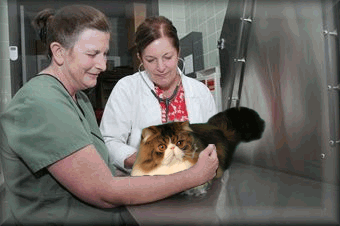Household Poisons and Cats
Many common items that can be found in most homes are toxic to cats. Below is a list of some of those items. I have also outlined some of the symptoms that are common.
What To Do: IMMEDIATELY CONTACT YOUR VETERINARIAN!
ASPC Poison Control Hot Line:
(888) 426-4435.
A consultation fee may apply.
Common Toxic Household Items
- laxatives
- lead
- acetaminophen
- acetone
- ant/bug traps and baits
- anti-flea foggers
- antifreeze
- antihistamines
- anti-rust agents
- antiseptics
- aspirin
- automobile batteries
- automotive coolant
- bath oil
- bleach
- boric acid
- brake fluid
- carburetor cleaner
- chocolate
- cleaning products
- cockroach poison or bait
- dandruff shampoo
- de-icers
- deodorants
- deodorizers
- detergents
- diet pills
- disinfectants
- drain cleaners
- dry-cleaning fluid
- dyes
- fertilizers
- fire-extinguisher foam
- fireworks
- flea spray, powder or shampoo
- fuels
- fungicides
- furniture polish
- gasoline
- hair coloring
- heart pills
- herbicides
- ibuprofen
- insecticides
- insect repellents
- kerosene
- lamp oil
- lead-based ceramics and paint
- lighter fluid
- liniments
- lye
- matches
- medications
- metal polish
- mineral spirits
- mothballs
- moth repellents
- motor oil
- nail polish
- nail polish remover
- onions
- pain relievers
- paint
- paint remover
- pastels (art crayons)
- perfume
- permanent-wave lotion
- photographic developers
- pine-based cleaners
- pine-oil products
- plant food
- rat/rodent poisons
- road salt
- rogaine
- rubbing alcohol
- rust remover
- shoe dye
- shoe polish
- sleeping pills
- snail or slug bait
- soaps
- solder
- solvents
- stain removers
- swimming-pool chemicals
- suntan lotion with cocoa butter
- turpentine
- weed killers
- windshield-washer fluid
- wood preservatives
Comm0n Signs of Household Poisoning
-
-
- convulsions
- diarrhea
- abdominal pain
- pale gums / tongue
- swollen tongue
- refusal of food
- continual vomiting
-
What To Do: IMMEDIATELY CONTACT YOUR VETERINARIAN!

ASPC Poison Control Hot Line:
(888) 426-4435.
A consultation fee may apply.
